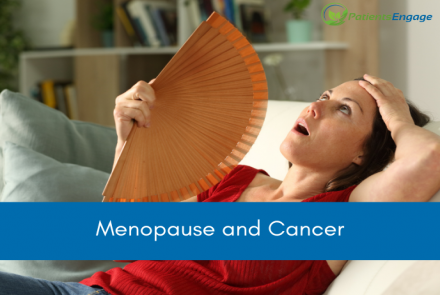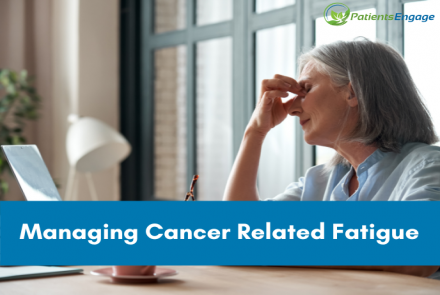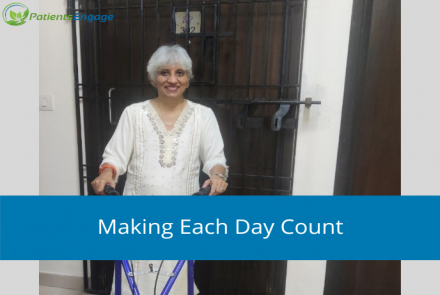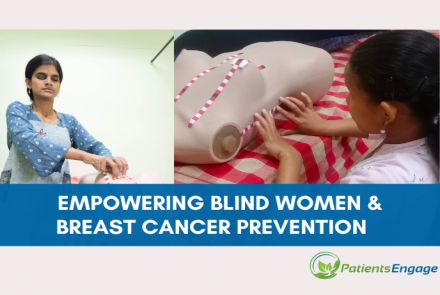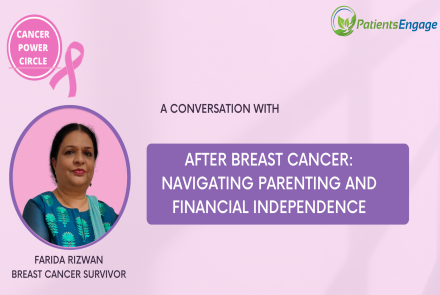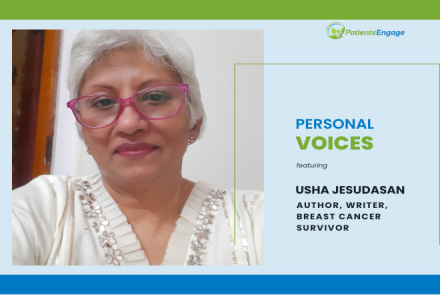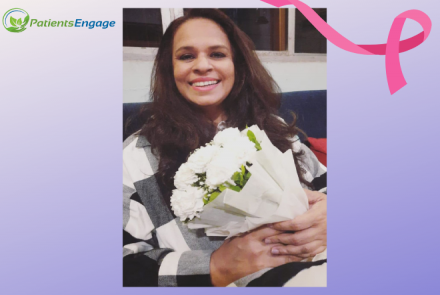
Dr Vani Parmar, Professor, Surgical Oncology, Breast Services, ACTREC had joined a webinar conducted by PatientsEngage on the management of side effects of hormone therapy for Breast Cancer. Here is a synopsis of some of the key points made by her.
The link to the complete video recording is below. Do watch it to listen to Dr. Vani Parmar but also the breast cancer patient Mamta Goenka and Tulsi Chikhal.
1. When is hormone therapy advised for Breast Cancer patients?
Treatment of Breast cancer is now based on the biology of the cancer, hence each patient’s cancer is different. There can be varying permutations and combinations regarding treatment that is offered. It is a multi-modality treatment with not just Chemotherapy and Radiation but also Hormonal therapy (HT) because some breast tumours express receptors that are hormone sensitive. The tumour may be responsive to estrogen receptors (ER) or progesterone receptors (PR). Hormones can be responsible in causing these tumours while anti-hormones play a role in treating such tumours. HT can be administered at different time points; however, majority of the patients are given HT after surgery. When given after surgery, it is termed Adjuvant therapy. If it is given before surgery, it is called Neoadjuvant and the aim is to shrink the tumour. In conclusion, HT is only given if the tumour has hormone receptors i.e. is ER or PR positive.
2. Can you please summarise the common side-effects?
I would like to emphasize that not all HT is terrible. Not everyone experiences all the adverse effects or in extreme severity. There are broadly two types of hormone therapy. One that blocks estrogen receptors and the other that lowers estrogen i.e. aromatase inhibitors.
Tamoxifen is a widely used drug in the first type of hormonal treatment. It acts by blocking the estrogen receptors and is used to treat women who have not gone through menopause. Women also benefit from suppression of ovaries and may be recommended to have them removed in some cases. Tamoxifen is often given in conjunction with Zoladex (Goserelin) to premenopausal women. This not only helps prevent recurrence of cancer but also protects the opposite breast from getting cancer. Hence it is important to take these drugs in spite of their side-effects.
All drugs come with their side-effects, but we have to learn to live and adjust with them. The benefits of being cancer-free are far greater. A lot of these side-effects are the same that all woman may undergo during her menopause. Menopausal symptoms are accepted as the normal part of our menstrual cycle. HT side-effects are due to induced menopause caused by exogenous hormones.
Tamoxifen and Zoladex (given as injection) acts as an anti-estrogen, whose effects come on suddenly and cause abrupt menstrual stoppage giving the body no time to acclimatise. This, therefore, makes the side-effects much harder to deal with. With time, the side-effects do start to reduce. One needs to tide over the initial period of change. In case of Aromatase Inhibitors, there are androgenic effects such as unwanted hair growth aka hirsutism and bone pains. Supplemental calcium (in tablet form) and bisphosphonate (injections) help improve bone health and prevent osteoporosis. If the bone depletion is severe, it can lead to decrease in bone density and risk of fractures. Bone mineral density scans can help detect this early. In some patients, the HT may need to be reduced or discontinued.
3. Are there ways to minimise these effects?
The younger women who are on Tamoxifen or on ovarian suppression may experience hot flashes, which tend to worsen on consumption of caffeinated drinks especially coffee. Exposure to certain temperatures also makes the hot flashes worse. Maintaining good hydration is prudent to reduce these effects. Majority of hot flashes are spontaneous but transient and usually settle down with time. The side-effects of Aromatase Inhibitors are not stimulated physiologically, so supplements are the best way to manage them.
4. Explain the difference between forced and induced menopause. Are they temporary or permanent?
Tamoxifen works on the uterus as well. In young women, when given alongside Chemotherapy, there is onset of induced menopause due to the shutdown in the functioning of the ovaries. Tamoxifen has two effects: an estrogenic and an anti-estrogenic. So certain organs (bones, uterus) have the estrogenic effects while certain other organs have the anti-estrogenic effects. The cancer gets the anti-estrogenic effect. Tamoxifen is thus called a Selective Estrogenic Receptor Modulator or SERM. Due to this whole milieu of estrogenic and anti-estrogenic conditions, the periods get affected. In some women it may become irregular, stop entirely and in rare cases become excessive. It is important to keep in mind that even though the periods have stopped, it does not interfere with the woman’s chances of getting pregnant. Women may get a false impression that no periods mean no conception will happen. Please note that pregnancy during Tamoxifen treatment is highly unadvised because Tamoxifen is harmful to the fetus. So, this temporary stop in periods is not really menopause but just the result of hormonal disturbance. After a period of 3-5 years, periods may restart even though Tamoxifen is ongoing. The younger the woman, the higher her chances of resuming her periods. The periods may be scanty, but it means that they are still pre-menopausal and not reached menopause yet.
5. Patient qt: I’m a Breast cancer survivor, took Tamoxifen for 5 years. It was stopped last year. I have now been diagnosed with lung sarcoidosis. Is it safe to take steroids?
Nowadays Tamoxifen is given for longer than 5 years, it may have been stopped for you if your sarcoidosis needed more attention. There is no direct interaction between hormone therapy and steroids. Just watch out for any symptoms if at all.
6. Patient qt: Does one get dark patches on areas where radiation could have left an imprint? My radiation was in 1998. Hormonal therapy stopped in 2004 and restarted in 2017 due to thyroid.
Skin irritation may be more related to inflammation or pigmentation but is not related to hormone therapy. Post-radiation pigmentation usually clears up in a few months. In some patients, there may be prominent blood vessels ( red streaks) that stay on in that area, but pigmentation does not stay for so long.
7. What fertility advice would you give for Breast Cancer patients?
There are various issues that can arise due to hormone therapy. There was a study that found that Zoladex given to women who were ER/PR negative and undergoing chemotherapy, had a protective effect. The chemotherapy was found to not cause harm to the ovaries because the Zoladex had already suppressed the ovaries. When Chemo and Zoladex treatments were completed, the ovaries resumed their function. During Chemotherapy, the ovaries stop functioning and chances of conception are reduced. For young patients, who haven’t started their families yet, this can be a tough decision. Chemotherapy targets ovaries because they are growing cells in the ovaries just like in a tumour. Infertility as a result of Chemo is termed as Secondary Infertility. To protect fertility, Zoladex is given to bring about medical ovarian suppression. Removal of ovaries is not advised for young patients. In older, post-menopausal patients, ovarian function may already have dwindled down, so changes to the ovaries is irrelevant, and hence modality of treatment differs.
8. Do you advise fertility preservation for young patients?
Women must realise that fertility preservation is not straight forward. Preservation of the eggs (ova), sperm or fertilised egg are ways to increase one’s chances of conception but are not guaranteed. There are lots of nuances that must be weighed in balance. Harvesting an egg (ovum) is actually a process that requires stimulating the ovary first to produces lots of eggs. This can consequently end up stimulating the cancer too, since tumours can be hormone sensitive. So, we do not advise repeated ovarian stimulations. One attempt before Chemotherapy has started is usually the best choice. For a healthy woman, ovarian stimulations can be done up to 6 times, but this is absolutely not recommended for a breast cancer patient.
9. Is Hormone therapy different than Hormone Replacement Therapy (HRT)?
Yes, very much so. In fact, these terms can be confused because they are used so loosely. In HRT, you are trying to replace what the body does not produce anymore. This may have been to natural menopause or reduced ovarian function. HRT is often used for women who want to continue to feel young, active and agile. Unfortunately, evidence exists that HRT can increase the risk of Breast Cancer by a hazardous ratio of 1:64. Hormone therapy given for Breast cancer patients is actually an anti-hormone treatment. This can include drugs that work as anti-estrogen, anti-progesterone, or progestins.
10. Patient qt: Can we contact doctors online now?
Yes, at Tata memorial hospital, we have started tele and video consultation facilities for all those patients who are unable to travel due to the COVID pandemic. WE can also help find you an Oncologist in your local area. To schedule an online consult, just go to the website tmc.gov.in and click on the link for the same.
Common Hormonal Therapy Side-effects and tips on how to manage them
By Dr Vani Parmar and Breast Cancer survivors
- Hot Flashes
Younger women who are on Tamoxifen or on ovarian suppression may experience hot flashes, which tend to worsen on consumption of caffeinated drinks especially coffee. Exposure to certain temperatures also makes the hot flashes worse. Maintaining good hydration is prudent to reduce these effects. Mixing peppermint oil and water and spraying that on the back of the neck can provide relief. Stay cool with loose, comfortable cotton clothing and avoid make-up. Majority of hot flashes are spontaneous but transient and usually settle down with time.
- Vaginal Dryness
Application of coconut oil is a very effective remedy. It also helps with rash, itching and flaking skin around the groin area.
- Joint/muscle pains
Often experienced first thing in the morning when getting out of bed. May affect large and small joints of the fingers and toes. Inactivity through the day worsen the pain and stiffness. Physical fitness and an exercise plan should be maintained to improve flexibility and reduce stiffness. Regular yoga and cardiovascular workout like walking is useful. Juice or soup of drumsticks is also considered a remedy.
- Hirsutism
Unwanted hair growth on the face along with thinning of hair in other areas is often seen.
- Decrease in sexual libido
Speak to a counselor and have these uncomfortable talks with your spouse.
- Weight Gain
Tamoxifen interestingly decreases the bad cholesterol or LDL in the body and hence can be protective against heart diseases. Aromatase Inhibitors also tend to alter the lipid profile. Exercise is the best way to control weight gain. The more the body fat, the more are the chances of failing treatment. This is because as induced menopause happens, there is peripheral aromatization, which means the body fat is converted to estrogen even though the ovary has stopped producing estrogen. In other words, the body fat becomes the source of estrogen which allows the cancer to grow.
- Mood swings
Women may experience anger, irritability, low mood, depression etc. These may vary from individual to individual and does affect not just the patients but their family members as well. Try to do things that bring happiness such as social interactions, hobbies like painting, gardening etc, activities like cooking, swimming, listening to music etc. Do things that you know help calm you like yoga or meditation. Talk to your family and friends as they play an important role in helping you deal with any mental health issues.
Past Convener, Breast Cancer Working Group
Professor, Surgical Oncology, Breast Services
Advanced Centre for Treatment, Research and Education in Cancer (ACTREC),
(Tata Memorial Centre & Homi Bhabha National Institute)


